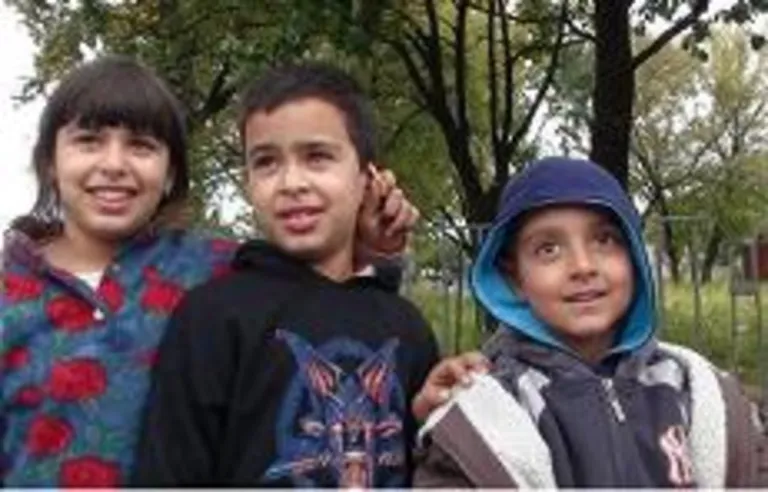Try to imagine that you live a peaceful life. The only concern you have is what to play with your friends, where to go, what mischief to make and what delicatessen to eat. What a worry in your little, carefree head! Suddenly you lose everything. You do not know what is going on around you. Everything is blowing up; strangers, armed to the teeth, are coming, destroying, torching, threatening, killing… You have no idea why the adults are so concerned. You can see elderly people, who are angry, scared, wounded; are shouting and crying. Boys and girls, a little bit older than you, are helping the adults. Others are running away. Terrible dither, noise, mess, fear. In general, that is how the story about the youngest generation in Chechnya begins. Years that should be remembered as the best, are the worst in their lives. Many families in Chechnya decide to leave the country, mainly because of their children- to give them an opportunity to live in the normal world, without a war, repression and evil. One leaves only when it is absolutely necessary; when he or she is in danger. When something wrong happens, when some relative is dead or when one is harmed. Chechens leave their country only when they are forced by circumstances and when it is unavoidable; to keep their family members alive. They do not choose Poland on purpose, that is not their intention. The truth is that Poland is geographically situated on their way to such destinations as Germany or France. On their way, for some reasons, they are made to stay in Poland. They simply do not have any chance to go further and they cannot or do not want to go back to the fatherland, because they fear for theirs and their children’s lives. For all these reasons children from Chechnya either start or continue school in Poland.
However there occurs a problem, namely with the language or cultural communication, which make their learning much more difficult. It is a huge problem. Because of the lack of understanding between children, coming from various cultures and having different past experiences, escalates a conflict. In all these cases appear such negative feelings as fear of unknown and incomprehensible; sometimes envy and some other time simple racial or religious prejudice. Theoretically in a school as an institution, where a teacher should be an authority who not only teaches, but also helps solve conflicts, he or she should intervene. In fact only few teachers do. It seems that children communicate without boundaries. Unfortunately sometimes instead of getting closer, they become strangers and grow up without bilateral understanding.
However, no matter how bad the situation may seem, there are some good organizations, schools and wonderful people whose aim is to overcome the obstacles of poor multicultural communication. From the bottom of their hearts they are trying to fight with that problem and they succeed very often. That is for example Towarzystwo Przyjaciół I Liceum Ogólnokształcącego (Society of Friends of Secondary School no 1), which is leaded by amazing, warm and devoted person - Krystyna Starczewska. Thanks to her and Gymnasium at Raszynska Street, me and a lot of foreigners, mostly Chechens, had a chance to find peace, tolerance and understanding. Thanks to her and the other teachers’ efforts, many foreigners could grow up in an atmosphere of real cooperation and friendship between students of different backgrounds, cultures, religions. There is also Teatr Dnia Ósmego (The Theatre of The Eight Day), in which my beloved auntie Ewa Wójcik and her team, full of marvelous and kind people, teach about Chechnya and its tragedy. They help understand and recognize not only the beauty, but also the sorrow of our country and nation. They work continuously staging plays showing a heart of the matter. The deeply believe in what they do, thus they make a go of it.
The next excellent example is Association of Drama Practitioners STOP-KLATKA, which also wants to help people to understand this difficult situation better, to solve their problems, to answer and to ask. I was honored to take part in one of their projects and you can believe me- it has been very important and meaningful experience which, I am sure will be useful in my future life. I have been led to believe that, despite everything, there is willingness, not feud, in people to discover different worlds and cultures. Also worth mentioning is Stowarzyszenie Praktyków Kultury (Association of Culture Practitioners), led by Daniel Brzeziński and his wife Nela.
Numerous wonderful people spend a lot of time, with all their hearts, on working for that case- to solve it together. About particular people who work hardly in the name of the survival of Chechen culture and the upbringing of my peers and children; about the people who simply give others a chance, I will write next time, if I will be given the chance. Believe me, there is a lot to write about. For me and for my fellows the most important thing is that all promises given by those people have always been kept. That theory becomes practice. Sometimes it is difficult, because one has to constantly and laboriously fight with negatives. It consumes loads of time and energy, but what I have seen and experienced on my own, those people, our friends, in a sense guardian angels sent by God, cope with this perfectly.
While writing this article, I was trying to give a certain message to you, my dear readers. There is a vast number of people whom you might know or not; who are trying to improve the world. They work with your children, they teach them how to look at the world and understand it; they try to make them interested. Although there is so many people who care about your offsprings, remember that it is you, who are the most important people in their lives. Children derive from home and family. That is why you should try to teach them openness to the world and respect for diversity; try to interest them of being good. Putting minimum effort in teaching your kids these virtues today, may make it easier to solve conflicts in the future, and as time goes by, they may never appear.
Text by Elsi Adajew
Translated by Joanna Tarnowska







